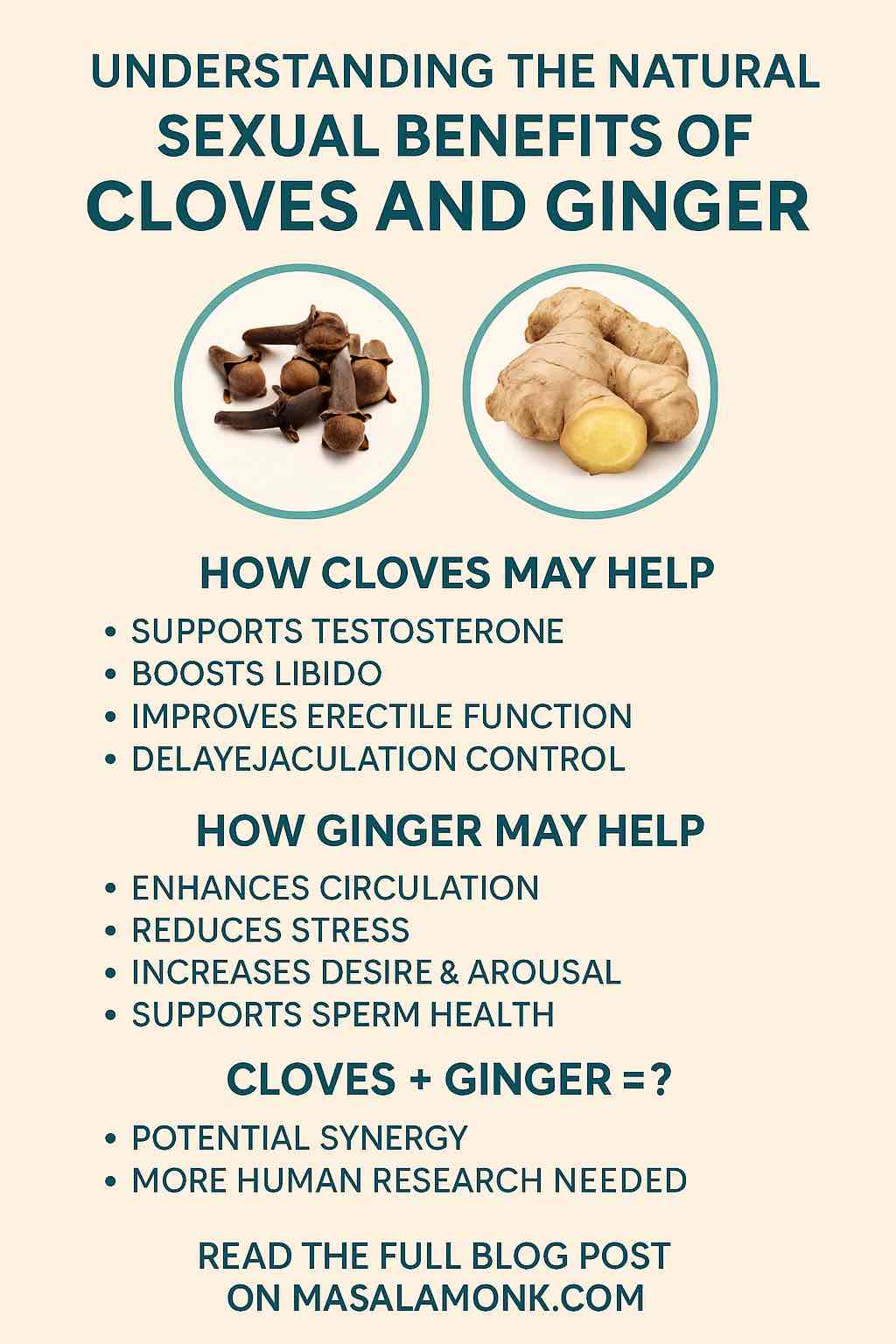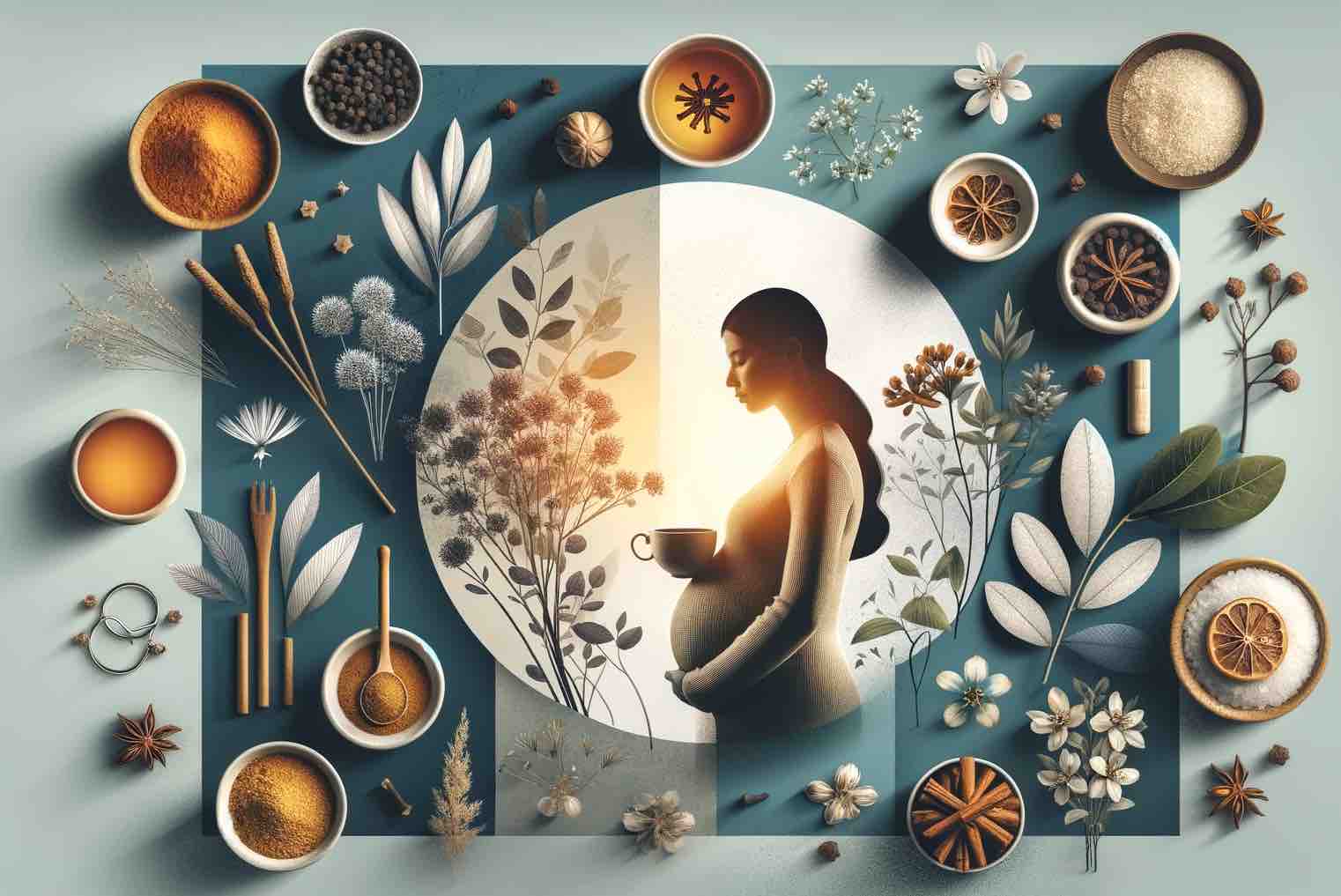
For thousands of years, spices have been more than flavor in our food. In Ayurveda, Chinese medicine, and countless folk traditions across the world, spices were the quiet healers of daily life. Among them, cloves and ginger have long carried a reputation that goes beyond the kitchen — they’ve been whispered about as natural aphrodisiacs, fertility boosters, and vitality tonics.
But how much of this is ancient myth, and how much is now supported by science? Let’s take a closer look.
🌿 Cloves: Tiny Buds with Powerful Secrets
Cloves — the dried flower buds of the Syzygium aromaticum tree — are best known for their warm aroma and use in curries, teas, and desserts. Yet in traditional medicine, they were often prescribed for energy, digestion, and reproductive health.
1. Circulation & Erectile Function
Good sex starts with good blood flow. Cloves contain eugenol, a powerful compound that relaxes blood vessels, improves circulation, and acts as a natural antioxidant.
- Animal studies have shown eugenol can improve erectile function in diabetic rats.
- In theory, better circulation = better performance for men.
👉 If you’re curious about practical uses, check out our deep dive: Clove-Infused Tea for Erectile Dysfunction
2. Testosterone & Libido Boost
Some evidence suggests cloves may stimulate testosterone production. In animal studies, low doses of clove extract boosted testosterone levels and sexual activity. However, higher doses actually reduced testosterone — showing us that with cloves, a little goes a long way.
3. Ejaculation Control
In a small human study, applying a mild clove oil gel before sex helped men delay ejaculation, thanks to its subtle numbing effect. This could be useful for men struggling with premature ejaculation — but remember, concentrated clove oil can burn the skin if used improperly.
4. Antioxidant Protection
Cloves rank among the richest antioxidant foods on earth. These antioxidants reduce oxidative stress — a silent factor behind erectile dysfunction, aging sperm, and reduced vitality.
🌱 Ginger: Fire in the Root
Ginger (Zingiber officinale) is another spice that has traveled centuries — from ancient Indian and Chinese kitchens to modern wellness teas. Known for its warming, fiery flavor, ginger has also been a go-to tonic for digestion, immunity, and, yes, sexual vitality.
1. Blood Flow & Arousal
Like cloves, ginger is excellent for circulation. It dilates blood vessels and helps regulate blood pressure — key for healthy sexual arousal. Men and women both rely on adequate blood flow for desire and performance.
👉 Explore more here: Ginger and Its Stunning Health Benefits
2. Stress & Oxidative Relief
Oxidative stress damages blood vessels, nerves, and hormones. Ginger’s antioxidants act like a repair crew, supporting healthy tissues and sexual function.
3. Testosterone & Fertility
In animal studies, ginger supplementation increased luteinizing hormone (LH), which signals the testes to produce testosterone. Ginger also improved sperm count, motility, and viability. For men facing fertility struggles, this points to a potential ally.
4. Human Evidence for Desire
This is where it gets exciting:
- A 2023 controlled trial found ginger boosted sexual arousal in participants exposed to erotic stimuli, especially after disgust-inducing tasks (suggesting ginger makes the mind more receptive to intimacy).
- A 2025 survey of nearly 500 Chinese adults found that regular ginger eaters reported higher sexual desire, stronger arousal, and more frequent sexual activity.
This means ginger isn’t just folklore — we’re finally seeing real-world data connecting it to human desire.
🌿🌱 Cloves + Ginger Together: A Promising Pair?
Here’s the honest truth: science hasn’t done much work on these two spices together. What we do know:
- Animal Study (2015): A blend of cloves, ginger, and cinnamon was given to diabetic rats. The results were remarkable — restored testosterone, improved sperm count, and even repair of testicular tissue. While this doesn’t prove the same in humans, it hints at powerful synergy.
- Culinary & Traditional Wisdom: In Ayurveda, cloves and ginger are often paired in teas and tonics to “warm the body” and stimulate vitality. Sexual energy was traditionally seen as part of overall life-force energy (ojas), and warming spices were thought to “wake it up.”
👉 Related Read: 5 Natural Spices that Work as Aphrodisiacs in Ayurveda
In simple terms: cloves may prime the body hormonally and through blood flow, while ginger clears the path with circulation and mental readiness. Together, they may complement each other beautifully.
⚠️ Safety Notes
- Cloves: Stick to culinary amounts or teas. High doses, concentrated oils, or supplements can irritate the stomach, harm fertility, or burn skin.
- Ginger: Generally safe, but in very high doses may thin the blood. If you’re on anticoagulants or preparing for surgery, consult your doctor.
- Topical use of clove oil: Always dilute in a carrier oil. A patch test is essential before trying.
✅ The Takeaway
Cloves and ginger are not just spices — they’re part of a centuries-old toolkit for energy, circulation, libido, and fertility.
- Cloves may support testosterone, libido, and erectile strength.
- Ginger may improve blood flow, desire, and sperm quality.
- Together, they show early promise, though human studies are still catching up.
The best way to harness them? Enjoy them daily as part of your diet — in teas, tonics, spice blends, or even simple warm water infusions. This way, you’re not just supporting your sexual health, but your entire body.
👉 Related Reads on MasalaMonk:
- Clove-Infused Tea for Erectile Dysfunction
- Ginger and Its Stunning Health Benefits
- Cardamom Benefits for Men
- Maca Root Benefits and Side Effects
- Chamomile Tea and Sexual Wellness
❓ Frequently Asked Questions (FAQs)
1. Do cloves really increase testosterone levels?
Cloves have shown promising results in animal studies where small doses boosted testosterone and sexual activity. However, higher doses had the opposite effect. For humans, more research is needed, but moderate dietary use may support hormone health.
2. Can ginger improve sexual desire?
Yes! A 2023 clinical study and a 2025 survey both showed ginger increased arousal and sexual desire in humans. Ginger also supports blood flow and reduces stress, both crucial for intimacy.
3. How can I use cloves and ginger for sexual health?
The simplest way is through food and beverages — add cloves and ginger to tea, warm water infusions, or spice blends. This ensures you get their benefits naturally, without overdoing it.
4. Can cloves help with premature ejaculation?
Yes, diluted clove oil gels have been studied for delaying ejaculation by creating a mild numbing effect. However, concentrated clove oil is very strong and can burn skin — always dilute and test carefully.
5. Does ginger help with male fertility?
Research suggests ginger may improve sperm count, motility, and quality by reducing oxidative stress and boosting testosterone. It’s been shown to support reproductive health in animal studies and some human trials.
6. Are cloves and ginger safe for women’s sexual health?
Absolutely. Both spices improve circulation and reduce oxidative stress, which can enhance arousal and overall vitality for women too. Ginger in particular has been studied for boosting female sexual desire.
7. Can I combine cloves and ginger for better results?
Yes. Though human studies are limited, an animal study combining cloves, ginger, and cinnamon showed improved testosterone, sperm quality, and testicular health. Traditionally, these spices are often paired in teas for vitality.
8. Are there any risks of consuming too much cloves or ginger?
Yes. High doses of cloves can reduce testosterone, cause stomach irritation, or damage the liver. Excess ginger may thin the blood, so those on anticoagulants should consult a doctor. Stick to culinary amounts or moderate teas.
9. How long before I notice results from cloves or ginger?
This depends on the individual and the issue. Improved circulation from ginger may be noticed within days. Hormonal and fertility benefits may take weeks of consistent use. These are lifestyle supports, not instant fixes.
10. Should I take clove or ginger supplements instead of using the spices?
Supplements exist, but they can be risky due to high concentrations. For most people, using cloves and ginger in daily cooking or teas is safer and provides additional nutritional benefits. Always consult your doctor before using supplements.










